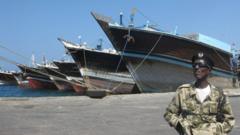Somaliland, which has operated as a de facto independent state since 1991, asserts ownership over these strategic facilities and views Somalia's efforts as a desperate maneuver. Below is the full article text.
In a bold move, Somaliland's Foreign Affairs Minister Abdirahman Dahir Aden publicly dismissed Somalia's recent offer made to US President Donald Trump, which aimed to grant exclusive access to the Berbera port and nearby airbase in exchange for enhancing US security operations in the region. Situated on the vital Gulf of Aden, Berbera city stands as a critical asset for maritime trade and military positioning.
Somaliland's declaration of independence during Somalia's tumultuous civil strife over three decades ago has created a deep-rooted sense of autonomy that the government in Hargeisa fiercely defends. Aden emphasized that such assets are not within Somalia's authority to allocate, reinforcing Somaliland's claim over them.
The offer from Somalia's President Hassan Sheikh Mohamud also includes proposals for ports and airbases within Somalia, aiming to bolster US interests against the burgeoning influence of nations like China and Russia within the Horn of Africa. Analysts suggest that the Somali government is eager to ensure continued US support, especially in light of threats posed by extremist groups like al-Shabab, which poses a persistent security challenge in the region.
Somalilanders harbor hopes that continued US ties may lead to formal recognition as a sovereign state, a significant milestone in the advocacy for their independence. Minister Aden has been vocal about this aspiration, tweeting, "There is nothing they can do to stop the upcoming recognition of Somaliland," reflecting the optimism that the US might soon become the first nation to recognize their republic.
The administration in Mogadishu has actively pursued lobbying efforts in Washington to assert its claims. Reports indicate that they secured a $600,000 annual agreement with a prominent advocacy firm to enhance diplomatic relations regarding the US-Somalia partnership.
However, the complex federal structure of Somalia, which encompasses semi-autonomous regions like Puntland—home to another proposed port at Bosaso—adds layers of difficulty for Mohamud's administration. Potential tensions with regional authorities may complicate matters if they perceive decisions being made without their consent, possibly exacerbating the already fraught relationships within the country.
The proposal involving airbases such as Baledogle, where US forces train Somali troops against al-Shabab, remains part of a larger discourse around American military investments in East African security.
Previous disputes over Somaliland's port have arisen, with incidents like Turkey's mediation to resolve a conflict stemming from Ethiopia's engagement with Somaliland further highlighting the ongoing geopolitical tensions in this pivotal region.
As the situation develops, all eyes will be on both the US response and the unfolding dynamics between Somalia and Somaliland as they negotiate control over these critical assets in their intertwined histories.
In a bold move, Somaliland's Foreign Affairs Minister Abdirahman Dahir Aden publicly dismissed Somalia's recent offer made to US President Donald Trump, which aimed to grant exclusive access to the Berbera port and nearby airbase in exchange for enhancing US security operations in the region. Situated on the vital Gulf of Aden, Berbera city stands as a critical asset for maritime trade and military positioning.
Somaliland's declaration of independence during Somalia's tumultuous civil strife over three decades ago has created a deep-rooted sense of autonomy that the government in Hargeisa fiercely defends. Aden emphasized that such assets are not within Somalia's authority to allocate, reinforcing Somaliland's claim over them.
The offer from Somalia's President Hassan Sheikh Mohamud also includes proposals for ports and airbases within Somalia, aiming to bolster US interests against the burgeoning influence of nations like China and Russia within the Horn of Africa. Analysts suggest that the Somali government is eager to ensure continued US support, especially in light of threats posed by extremist groups like al-Shabab, which poses a persistent security challenge in the region.
Somalilanders harbor hopes that continued US ties may lead to formal recognition as a sovereign state, a significant milestone in the advocacy for their independence. Minister Aden has been vocal about this aspiration, tweeting, "There is nothing they can do to stop the upcoming recognition of Somaliland," reflecting the optimism that the US might soon become the first nation to recognize their republic.
The administration in Mogadishu has actively pursued lobbying efforts in Washington to assert its claims. Reports indicate that they secured a $600,000 annual agreement with a prominent advocacy firm to enhance diplomatic relations regarding the US-Somalia partnership.
However, the complex federal structure of Somalia, which encompasses semi-autonomous regions like Puntland—home to another proposed port at Bosaso—adds layers of difficulty for Mohamud's administration. Potential tensions with regional authorities may complicate matters if they perceive decisions being made without their consent, possibly exacerbating the already fraught relationships within the country.
The proposal involving airbases such as Baledogle, where US forces train Somali troops against al-Shabab, remains part of a larger discourse around American military investments in East African security.
Previous disputes over Somaliland's port have arisen, with incidents like Turkey's mediation to resolve a conflict stemming from Ethiopia's engagement with Somaliland further highlighting the ongoing geopolitical tensions in this pivotal region.
As the situation develops, all eyes will be on both the US response and the unfolding dynamics between Somalia and Somaliland as they negotiate control over these critical assets in their intertwined histories.





















